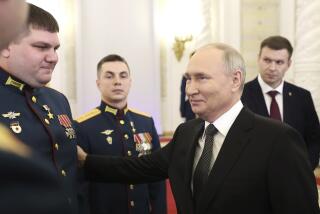After Yeltsin, Who?
Vice President Al Gore didn’t get to see Russia’s President Boris Yeltsin at the Kremlin last Monday as planned, but he was able to visit him the next day at a nearby sanitarium, saying tactfully afterward that he found his host looking “very good.” Television film in fact showed Yeltsin looking little different and certainly no better than he had in the carefully edited TV images the public saw in the final days of his reelection campaign: weary, waxen and showing every sign of being a seriously sick man whose ability to carry on with his job has to be open to doubt.
Yeltsin has had heart problems, suffers from back trouble and possibly other ailments and is notorious for his powerful attachment to the bottle. On occasion, during his reelection campaign, he exhibited remarkable energy. But those displays were later paid for with prolonged disappearances from public view. For the most part, the world has seen Yeltsin only on recorded television since well before his reelection on July 3. Such censorship does not support assurances from his aides or even visiting dignitaries that the president is well.
The business of preparing for a second Yeltsin term nonetheless goes on. Viktor Chernomyrdin remains as prime minister and the president’s constitutionally designated successor. Anatoly B. Chubais, a strong free-market advocate, has been brought back as Yeltsin’s chief of staff, after being dumped last January and blamed by Yeltsin for all of Russia’s economic woes. Chubais, popular in the West, is hated by many in Russia for economic reforms that wiped out the savings of millions of retirees. Now Yeltsin has named as defense minister the controversial Gen. Igor Rodionov--known to some as the “Butcher of Tbilisi”--on the recommendation of Alexander I. Lebed, his chief security advisor. This seems to bolster Lebed’s standing in what has become a deep political rivalry with Chernomyrdin.
A Yeltsin who is plainly in failing health inevitably raises speculation about Russia’s future. This month’s election was an emphatic rejection of a return to the Soviet era, and there’s reason to hope that Russia is now well launched on the route to transforming itself from its authoritarian past. But it increasingly appears that someone other than Yeltsin will have to guide it into the future.
More to Read
Sign up for Essential California
The most important California stories and recommendations in your inbox every morning.
You may occasionally receive promotional content from the Los Angeles Times.










